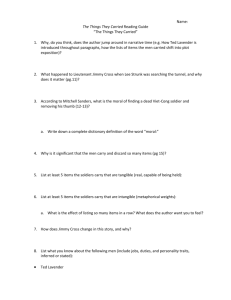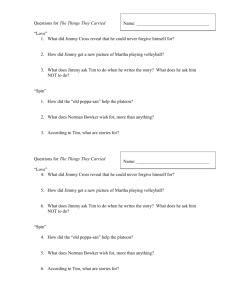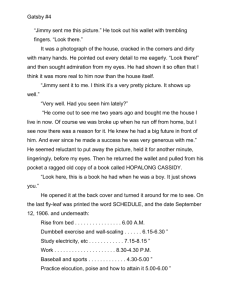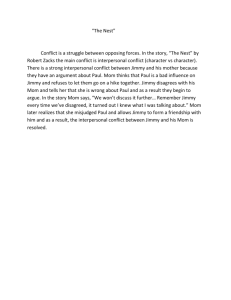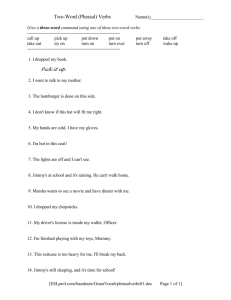EN107, Week Two Look Back in Anger Roots (time permitting)
advertisement
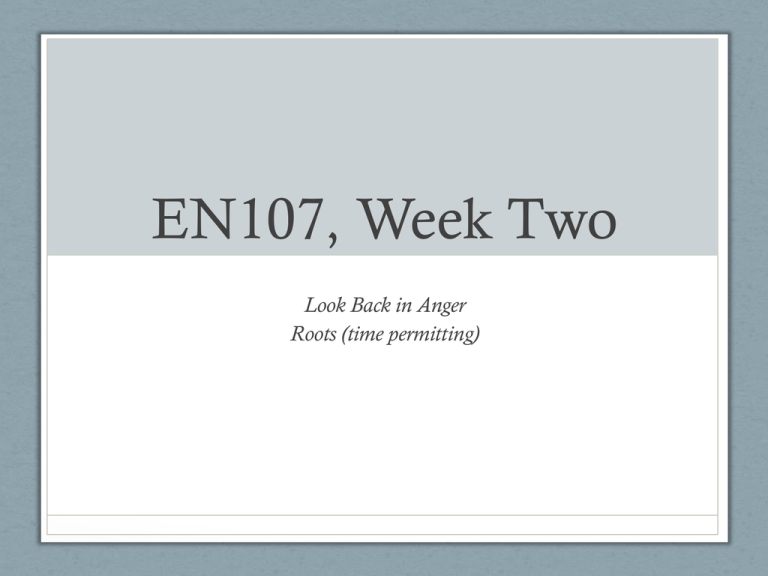
EN107, Week Two Look Back in Anger Roots (time permitting) Structure • How is the play divided? • Discrete, long acts? Shorter scenes? Contextless lines of dialogue? • Audience focus • Presentation of information • How long is the play? • Text: how long does it take to read, and how difficult is it to read? • Performance: how long would this play take to perform? • Repetition • What elements are repeated? What does repetition do? Plot • Does the play possess a consistent plot? • Is this plot fulfilled? • Sequence • Sequential • Non-sequential • Sequence unclear LANGUAGE • GO HERE FIRST • “Close reading”/”practical criticism” • Polyvalence (multiple meanings) • Clarification (single meanings) • Nonsense (meaninglessness) • Oral presence • Are speeches hard to say out loud? • Do the speeches make you talk in particular ways? • Is there a rhythm to the words, or some other oral ordering? The Porters' one-room flat in a large Midland town. Early evening. April. The scene is a fairly large attic room, at the top of a large Victorian house. The ceiling slopes down quite sharply from L. to R. Down R. are two small low windows. In front of these is a dark oak dressing table. Most of the furniture is simple, and rather old. Up R. is a double bed, running the length of most of the back wall, the rest of which is taken up with a shelf of books. Down R. below the bed is a heavy chest of drawers, covered with books, neckties and odds and ends, including a large, tattered toy teddy bear and soft, woolly squirrel. Up L. is a door. Below this a small wardrobe. Most of the wall L. is taken up with a high, oblong window. This looks out on to the landing, but light comes through it from a skylight beyond. Below the wardrobe is a gas stove, and, beside this, a wooden food cupboard, on which is a small, portable radio. Down C. is a sturdy dining table and three chairs, and, below this, L. and R., two deep, shabby leather armchairs. Why don't you? That would be something, anyway. (Crosses to chest of drawers R.) But I haven't told you what it means yet, have I? (Picks up dictionary.) I don't have to tell her – she knows. In fact, if my pronunciation is at fault, she'll probably wait for a suitably public moment to correct it. Here it is. I quote: Pusillanimous. Adjective. Wanting of firmness of mind, of small courage, having a little mind, mean spirited, cowardly, timid of mind. From the Latin pusillus, very little, and animus, the mind. (Slams the book shut.) That's my wife! That's her isn't it? Behold the Lady Pusillanimous. (Shouting hoarsely.) Hi, Pusey! When's your next picture? Q: What are stage directions like in the play? How do they address the audience? What freedoms of interpretation do they imply, and what freedoms do they restrict? Alison The game we play: bears and squirrels, squirrels and bears. Helena looks rather blank. Yes, it's quite mad, I know. Quite mad. (Picks up the two animals.) That's him… And that's me… Helena I didn't realize he was a bit fey, as well as everything else! Alison Oh, there's nothing fey about Jimmy. It's just all we45seem to have left. Or had left. Even bears and squirrels seem to have gone their own way now. Helena Since I arrived? Alison It started during those first months we had alone together – after Hugh went abroad. It was the one way of escaping from everything – a sort of unholy priest-hole of being animals to one another. We could become little furry creatures with little brains. Full of dumb, uncomplicated affection for each other. Playful, careless creatures in their own cosy zoo for two. A silly symphony for people who couldn't bear the pain of being human beings any longer. And now, even they are dead, poor little silly animals. They were all love, and no brains. (Puts them back.) Suggested key terms/concepts • Noise • “Edwardian” / “Victorian” • Americans • Newspapers • Your suggestions? ONSTAGE performance • Ensemble • Why are these characters together? • What characters are on stage at any given moment? • Who understands other characters’ dialogue, and who fails to? • Are there multiple overlapping worlds onstage? • Characters in multiple times, places, settings • What juxtapositions are created? • Mise-en-scene • Where could this play be performed, and where not? • What properties appear onstage? At rise of curtain, Jimmy and Cliff are seated in the two armchairs R. and L., respectively. All that we can see of either of them is two pairs of legs, sprawled way out beyond the newspapers which hide the rest of them from sight. They are both reading. Beside them, and between them, is a jungle of newspapers and weeklies. When we do eventually see them, we find that Jimmy is a tall, thin young man about twenty-five, wearing a very worn tweed jacket and flannels. Clouds of smoke fill the room from the pipe he is smoking. He is a disconcerting mixture of sincerity and cheerful malice, of tenderness and freebooting cruelty; restless, importunate, full of pride, a combination which alienates the sensitive and insensitive alike. Blistering honesty, or apparent honesty, like his, makes few friends. To many he may seem sensitive to the point of vulgarity. To others, he is simply a loudmouth. To be as vehement as he is is to be almost non-committal. Cliff is the same age, short, dark, big boned, wearing a pullover and grey, new, but very creased trousers. He is easy and relaxed, almost to lethargy, with the rather sad, natural intelligence of the self-taught. If Jimmy alienates love, Cliff seems to exact it – demonstrations of it, at least, even from the cautious. He is a soothing, natural counterpoint to Jimmy. Jimmy (Quickly) Did you read about the woman who went to the mass meeting of a certain American evangelist at Earls Court? She went forward, to declare herself for love or whatever it is, and, in the rush of converts to get to the front, she broke four ribs and got kicked in the head. She was yelling her head off in agony, but with 50,000 people putting all they'd got into 'Onward Christian Soldiers', nobody even knew she was there. (He looks up sharply for a response, but there isn't any.) Sometimes, I wonder if there isn't something wrong with me. What about that tea? Cliff (Still behind paper) What tea? Oh, yes. There's a Vaughan Williams. Well, that's something, anyway. Something strong, something simple, something English. I suppose people like me aren't supposed to be very patriotic. Somebody said – what was it – we get our cooking from Paris (that's a laugh), our politics from Moscow, and our morals from Port Said. Something like that, anyway. Who was it? (Pause.) Well, you wouldn't know anyway. I hate to admit it, but I think I can understand how her Daddy must have felt when he came back from India, after all those years away. The old Edwardian brigade do make their brief little world look pretty tempting. All homemade cakes and croquet, bright ideas, bright uniforms. Always the same picture: high summer, the long days in the sun, slim volumes of verse, crisp linen, the smell of starch. What a romantic picture. Phoney too, of course. It must have rained sometimes. Still, even I regret it somehow, phoney or not. If you've no world of your own, it's rather pleasant to regret the passing of someone else's. I must be getting sentimental. But I must say it's pretty dreary living in the American Age – unless you're an American of course. Perhaps all our children will be Americans. That's a thought isn't it? He gives Cliff a kick, and shouts at him. I said that's a thought! Offstage, in performance • Audience • What sort of audience does the play address? • What do they know? • What do they believe? But why you? My daughter… No. Perhaps Jimmy is right. Perhaps I am a – what was it? an old plant left over from the Edwardian Wilderness. And I can't understand why the sun isn't shining any more. You can see what he means, can't you? It was March 1914 when I left England, and, apart from leaves every ten years or so, I didn't see much of my own country until we all came back in '47. Oh, I knew things had changed, of course. People told you all the time the way it was going – going to the dogs, as the Blimps are supposed to say. But it seemed very unreal to me, out there. The England I remembered was the one I left in 1914, and I was happy to go on remembering it that way. Beside, I had the Maharajah's army to command – that was my world, and I loved it, all of it. At the time, it looked like going on for ever. When I think of it now, it seems like a dream. If only it could have gone on for ever. Those long, cool evenings up in the hills, everything purple and golden. Your mother and I were so happy then. It seemed as though we had everything we could ever want. I think the last day the sun shone was when that dirty little train steamed out of that crowded, suffocating Indian station, and the battalion band playing for all it was worth. I knew in my heart it was all over then. Everything.
